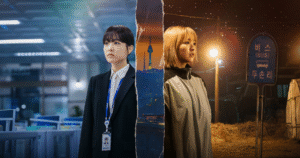The Utopian Dream Turned Sour: Unpacking the Complexities of Newtopia on Prime Video
A Vision of Rebirth: Establishing a Utopian Ideal Amidst Apocalypse
Prime Video’s Newtopia presents a compelling, albeit ultimately fractured, vision of societal reinvention. Set against the backdrop of a devastating zombie apocalypse in Seoul, South Korea, the web series initially lures viewers with the promise of rebuilding and the allure of utopian ideals. However, as the narrative unfolds, Newtopia masterfully dissects the inherent challenges of creating a perfect society from the remnants of a broken world, exposing the fault lines of human nature and the fragility of even the most well-intentioned plans. The series, starring Blackpink’s Jisoo, transcends the typical zombie genre fare by using the undead threat as a catalyst to explore complex themes of class, leadership, survival, and the enduring human capacity for both altruism and self-interest. The premise of Newtopia is inherently captivating: in the wake of a zombie outbreak that has ravaged South Korea, a diverse group of survivors seeks refuge and attempts to establish a new, ideal society. This “Newtopia” is envisioned as a haven built on principles of equality, cooperation, and shared resources, a stark contrast to the chaos and brutality of the outside world. The initial episodes of the series effectively portray the arduous process of establishing this new order, showcasing the collaborative efforts, the implementation of rules, and the initial sense of hope that binds the community together. This focus on societal structure and governance distinguishes Newtopia from more action-oriented zombie narratives, inviting viewers to consider the practical and philosophical challenges of building a better future.

The Cracks in the Foundation: The Erosion of Ideals and the Resurgence of Human Nature
However, Newtopia smartly avoids painting a simplistic picture of utopian bliss. As the series progresses, cracks begin to appear in the seemingly perfect facade. The inherent diversity of the survivor group, initially a strength, becomes a source of tension as pre-apocalyptic social hierarchies and personal ambitions resurface. Conflicts arise over resource allocation, leadership decisions, and differing visions for the future of Newtopia. The series astutely demonstrates how deeply ingrained societal biases and individual desires can undermine even the most egalitarian ideals. The constant threat of the zombies lurking outside the settlement serves not only as a source of external danger but also as a pressure cooker, exacerbating internal conflicts and forcing the inhabitants to confront their own moral compromises in the name of survival.
Leadership and Relationships Under Pressure: Navigating Responsibility and Personal Bonds
Jisoo’s performance is a significant anchor for the series, bringing both vulnerability and resilience to her character. As a key figure in the establishment and maintenance of Newtopia, her character grapples with the immense responsibility of leadership and the difficult choices that must be made for the perceived greater good. The series explores the toll that such responsibility takes, highlighting the erosion of idealism in the face of harsh realities. Furthermore, Newtopia delves into the complexities of human relationships amidst crisis. Romantic entanglements, familial bonds, and the formation of new alliances are all tested by the constant pressure of survival and the ideological clashes within the community. These interpersonal dynamics add layers of emotional depth to the narrative, making the struggles and sacrifices of the characters resonate more profoundly with the audience.
The Unattainable Utopia: A Reflection on Human Nature and Societal Reinvention
Ultimately, Newtopia on Prime Video offers a thought-provoking exploration of utopian aspirations and their inevitable collision with the complexities of human nature. While the promise of a perfect society forms the initial draw, the series excels in its nuanced portrayal of the challenges and compromises inherent in such an endeavor. By setting its story against the backdrop of a zombie apocalypse, Newtopia raises fundamental questions about social organization, leadership, and the enduring human capacity for both cooperation and conflict. The series serves as a potent reminder that even in the face of catastrophe, the flaws and strengths of humanity remain central to shaping any future, rendering the dream of a flawless “Newtopia” perpetually just out of reach.



















